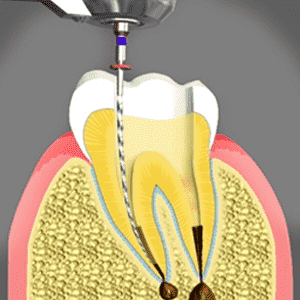
Most people are afraid to even hear the word ‘root canal’; yet millions of people need to undergo this treatment to save their teeth. Dentistry has come a long way and root canals are a far more advanced procedure than what they used to be.
A root canal treatment becomes important when the soft tissue (or pulp) inside your root canal is infected or inflamed. The pulp is essentially a soft-feeling substance found at the center of a tooth. It is comprised of the blood vessels, connective tissue, and the nerve. The term ‘pulp chamber’ may be used for referring to the visibly hollow central part of your tooth. This is the part which carries the pulp. The pulp chamber continues to extend down the canals, through the teeth roots and finally into the immediate bone.
The infection or inflammation could result from a range of different causes including chipping or cracking of the tooth, severe decay or repeated dental treatment on a tooth. Sometimes, a tooth injury could also damage the pulp, even when there aren’t any visible cracks or chips in the tooth. When infection or inflammation of the pulp is not addressed, it could result in pain or an abscess.
Further, a root canal infection can lead to:
Our dentist is specialized in performing root canal treatment in glendale. If you are experiencing pain or are in need of a root canal, call us or schedule online and one of our staff will get in touch with you shortly.
In order to confirm the need for a root canal treatment, Dr. Haghverdian first schedules an initial consultation where he may perform a special pulp vitality exam or take an x-ray. In the majority of the pulp tests, a slightly cold stimulus is placed on the damaged tooth and this helps in checking for a normal and healthy response. Several teeth are tested in order to make a comparison of the responses. When confirmation from the tests call for root canal treatment, we will schedule the necessary appointment for the patient.
In a root canal treatment, we will remove the infected or inflamed pulp and carefully clean and shape the internal part of your root canal. In the final step, the area is filled and sealed. After this, the dentist will fix a restoration, such as a crown, on your tooth in order to protect it and make it fully functional. Once the restoration procedure is completed, the treated tooth starts functioning like a normal tooth.
Patients can experience anxiety about the possibility of experiencing pain or discomfort during a root canal treatment. The doctor will take care of this concern by first numbing the affected tooth with the help of local anesthesia. This helps ensure that the patient is absolutely comfortable during the procedure. Once the tooth is adequately numb, he will put a rubber block on top of the tooth. This rubber block comprises a special metal clamp which helps in holding the latex sheet around your tooth. The latex sheet allows the tooth to remain isolated and clean from contaminants and saliva.
You can generally expect a root canal to take 1 or 2 appointments, each about an hour or so long.
After your root canal treatment is completed, your tooth might feel a bit sensitive for a couple of days. This is due to the inflammation of the natural tissue, particularly if you had infection or pain prior to the procedure. Until the root canal treatment is completed (including placement of the filling or crown), it is advisable to avoid too much chewing with the repaired tooth.
It is possible to control this discomfort or sensitivity with the help of OTC pain medicines like ibuprofen. Teeth that undergo a root canal procedure are usually more prone to breakage or chipping. Hence, dentists often place dental crowns on these teeth in order to protect them.
The root canal procedure is among the most successful endodontic treatments and has a success rate of over 95 percent. In numerous cases, a root canal treated tooth could last for up to a lifetime.
If you are in need of root canal treatment, feel free to schedule a consultation at Smile Dental Practice in Glendale.
We’re here to help our patients achieve their dental goals and dream smile. Contact our office today to schedule your next dental visit at our Glendale Dentist office.
SCHEDULE AN APPOINTMENT TODAY AT DENTAL OFFICE IN GLENDALE
Getting your dream smile is easier than you think.
At Smile Dental Practice we welcome you on the journey towards a complete transformation of your smile! Please contact us if you have any questions or to schedule a consultation.

Accessibility Menu
based on 100 reviews
based on 1 reviews
based on 40 reviews
based on 1 reviews
based on 5 reviews
based on 100 reviews
based on 1 reviews
based on 40 reviews
based on 1 reviews
based on 5 reviews